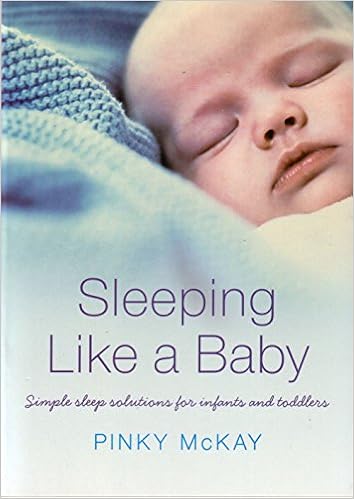Whilst lamenting my latest sleepless night to a friend, she offered to loan me her copy of Richard Ferber's bestselling/notorious book, Solve Your Child's Sleep Problems*. I balked at it, but she said that I might find the section on sleep disorders interesting. She's a very good friend, so I accepted the book, and let it sit on my nightstand for a little while, looking very incongruous next to Dr. Sears' Baby Book.
Then, one night, after a particularly rough bedtime, I picked it up and started flipping to different sections. My friend had made the point that, although I might not agree with his methods, Ferber is a doctor, and not just another mom like Elizabeth Pantley. I was surprised to find that the entire book (it's actually rather hefty) was not all about letting babies cry in their bedrooms. The section on sleep disorders was quite interesting, as was the section on addressing specific sleep difficulties. It was the first sleep book I'd read that addressed extended night waking in a productive way, and it gave me a new idea of something to try with DC, who just turned one. I'm actually quite glad that I read parts of the book. (To be honest, I don't see myself reading the whole thing because I find CIO methods upsetting to read about).
My daughter, AW, is almost three and has always been a fantastic sleeper, so I haven't been doing too much reading on toddler sleep. On the other hand, there is a growing list of positive parenting books on my Amazon wish list, and I've read a few already. I've also been spending time reading about approaches to eating, with the desire to help her cultivate a healthy relationship with food. My sister recommended Kids, Carrots, and Candy by Jane Hirschmann. I didn't agree with everything in this book either (it said that comfort nursing would create unhealthy associations with using food for comfort). The book recommends giving children free rein over their food choices to allow them to listen to their bodies, rather than insisting on clean plates at every meal. Free rein isn't completely for us, but we did establish a snack basket and are trying to resist forcing her to eat if she isn't hungry.
I'm glad I read both of these books, even though I didn't come away loving them. They both gave me useful information, but my own parenting style remained intact. While writing this post, I realized that I use OBC's guiding principles when reading parenting advice, whether in blogs or books, even though I don't word it that way to myself. Here they are:
- Trust your instincts.
- You can’t spoil a baby.
- If what you are doing is working for you, your partner, and your baby, great! Keep doing it!
- If what you are doing is not working for you, your partner, or your baby, it’s ok! You can change it!
- There are no magical times when you must start or stop something.
- No habit you create now is irreversible.
- And never forget, trust your instincts!
As you can see, it's so important to trust your instincts. That should always come first. I turn to parenting books when my instincts aren't giving me enough information, and I reject anything that doesn't align with my instincts (such as letting a baby cry or refusing to make eye contact with my baby). Even before I was an OBC teacher and agreed to promote these guiding principles, they aligned with what I believed as a parent, so they are great in helping me decide what advice might be helpful.
*In case you haven't heard of the Ferber method or "Ferberizing," it is a form of cry-it-out (CIO) sleep training, which is recommended against by Our Baby Class.


